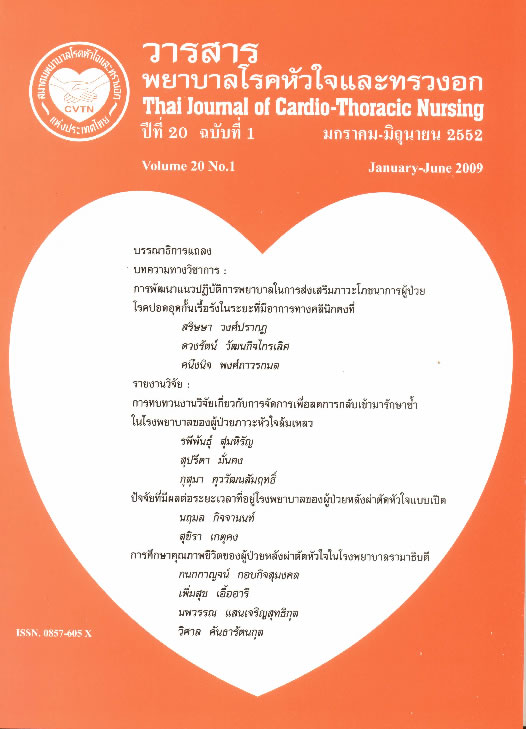ปัจจัยที่มีความสัมพันธ์กับพฤติกรรมส่งเสริมสุขภาพของผู้ป่วยภาวะห้วใจล้มเหลว
Keywords:
การรับรู้สมรรถนะแห่งตน, ภาวะหัวใจล้มเหลว, พฤติกรรมส่งเสริมสุขภาพ, Self-Efficacy, Congestive Heart Failure, Health Promoting BehaviorAbstract
บทคัดย่อ
การวิจัยเชิงบรรยายครั้งนี้มีวัตถุประสงค์ เพื่อศึกษาปัจจัยที่มีความสัมพันธ์กับพฤติกรรมส่งเสริมสุขภาพ ของผู้ป่วยภาวะหัวใจล้มเหลว โดยใช้กรอบแนวคิดทฤษฎีส่งเสริมสุขภาพของเพนเดอร์ เลือกกลุ่มตัวอย่าง แบบเจาะจง จำนวน 100 ราย ที่มารับการตรวจรักษาที่คลินิกโรคหัวใจ แผนกผู้ป่วยนอก วิทยาลัยแพทยศาสตร์ กรุงเทพมหานคร และวชิรพยาบาล เครื่องมือที่ใช้ในการวิจัยประกอบด้วย แบบบันทึกข้อมูล ส่วนบุคคล แบบสอบถามความรู้เกี่ยวกับการปฏิบัติพฤติกรรมสุขภาพ แบบสอบถามการรับรู้ประโยชน์ของ
สุขภาพเมื่อมีภาวะหัวใจล้มเหลว แบบสอบถามการรับรู้สมรรถนะแห่งตนเมื่อมีภาวะหัวใจล้มเหลว และแบบสอบถามพฤติกรรมส่งเสริมสุขภาพเมื่อมีภาวะหัวใจล้มเหลว วิเคราะห์ข้อมูลโดยใช้ความถี่ ร้อยละ ค่าเฉลี่ย ค่าเบี่ยงเบนมาตรฐาน และหาค่าสัมประสิทธ์สหสัมพันธ์ของเพียร์สัน
ผลการวิจัยพบว่า กลุ่มตัวอย่างมีคะแนนเฉลี่ยด้านความรู้เกี่ยวกับการปฏิบัติพฤติกรรมสุขภาพอยู่ใน ระดับดีมาก ( = 91.91, SD = 6.97) การรับรู้ประโยชน์ของพฤติกรรมส่งเสริมสุขภาพเมื่อมีภาวะหัวใจ ล้มเหลวอยู่ในระดับมาก (
= 43.17, SD = 5.74) การรับรู้อุปสรรคของพฤติกรรมส่งเสริมสุขภาพเมื่อมี ภาวะหัวใจล้มเหลวอยู่ในระดับปานกลาง (
= 25.84, SD = 5.68) การรับรู้สมรรถนะแห่งตนเมื่อมีภาวะ หัวใจล้มเหลวอยู่ในระดับมากที่สุด (
= 200.19, SD = 21.91) และพฤติกรรมส่งเสริมสุขภาพเมื่อมีภาวะ หัวใจล้มเหลวอยู่ในระดับดี (
= 46.42, SD = 6.95) และผลการวิจัยยังพบว่าความรู้เกี่ยวกับการปฏิบัติ พฤติกรรมสุขภาพ การรับรู้ประโยชน์ของพฤติกรรมส่งเสริมสุขภาพ และการรับรู้สมรรถนะแห่งตนเมื่อมี ภาวะหัวใจล้มเหลวมีความสัมพันธ์ทางบวกกับพฤติกรรมส่งเสริมสุขภาพเมื่อมีภาวะหัวใจล้มเหลวอย่างมีนัยสำคัญทางสถิติที่ระดับ 0.01 (r = 0.438, 0.324, 0.489 ตามลำตับ) การรับรู้อุปสรรคของพฤติกรรม ส่งเสริมสุขภาพมีความสัมพันธ์ทางลบกับพฤติกรรมส่งเสริมสุขภาพเมื่อมีภาวะหัวใจล้มเหลวอย่างมีนัยสำคัญ ทางสถิติที่ระดับ 0.05 (r = - 0.205) ข้อเสนอแนะจากการวิจัยคือ การส่งเสริมให้ผู้ป่วยภาวะหัวใจล้มเหลว มีความรู้เกี่ยวกับการปฏิบัติพฤติกรรมสุขภาพ จะช่วยให้ผู้ป่วยมีความมั่นใจและเห็นประโยชน์ของพฤติกรรม ส่งเสริมสุขภาพรวมทั้งช่วยลดอุปสรรคที่จะขัดขวางการทำพฤติกรรมส่งเสริมสุขภาพเมื่อมีภาวะหัวใจล้มเหลว
คำสำคัญ : การรับรู้สมรรถนะแห่งตน, ภาวะหัวใจล้มเหลว, พฤติกรรมส่งเสริมสุขภาพ
ABSTRACT
This research was conducted to study the factors related to health behavior among patients with congestive heart failure. Penderûs Health Promotion was used as the research framework. Purposive sampling was used to select 100 patients with congestive heart failure from the cardiology clinic, out-patient departments of Bangkok Metropolitan Administration Medicine College and Vajira Hospital. The following instruments were used to collect the data: the demographic data assessment form, the knowledge of health promoting behavior questionnaire, the perceived benefits and perceived barriers from health promoting behavior with heart failure questionnaire, the perceived self-efficacy with heart failure questionnaire, and the practiced health promoting behaviors with heart failure questionnaire. Data were analyzed in terms of frequency, percentage, mean, standard deviation and Pearsonûs product moment correlation coefficient. The findings of this study showed that the respondents had a very high level of knowledge of health promoting behaviors ( = 91.91, SD = 6.97), a high score of perceived benefits from health promoting behavior after heart failure (
= 43.17, SD = 5.74), a moderate score of perceived barriers from health promoting behavior after heart failure (
= 25.84, SD = 5.68), a very high score of perceived self-efficacy with heart failure (
= 200.19, SD = 21.91), and a high score of practiced health promoting behaviors (
= 46.42, SD = 6.95). In addition, the results revealed that knowledge about health promoting behaviors, perceived benefits in health promoting behavior, and perceived self-efficacy were positively related to perceived health promoting behaviors with heart failure at a 0.01 level of statistical significance (r = 0.438, 0.324, 0.489 respectively). The item: perceived barriers to health promoting behavior, was negatively related to practiced health promoting behavior with heart failure, at a 0.05 level of statistical significance (r = -0.205). The findings of this study suggest that there is a benefit in promoting knowledge regarding proper health behaviors among patients with congestive heart failure, in order to improve perceived benefits, self-efficacy and reduce perceived barriers.
Keywords:
Self-Efficacy, Congestive Heart Failure, Health Promoting Behavior
Downloads
How to Cite
Issue
Section
License
บทความนี้ยังไม่เคยตีพิมพ์หรืออยู่ในระหว่างส่งไปตีพิมพ์ในวารสารอื่น ๆ มาก่อน และกองบรรณาธิการขอสงวนสิทธิ์ในการตรวจทาน และแก้ไขต้นฉบับตามเกณฑ์ของวารสาร ในกรณีที่เรื่องของท่านได้ได้รับการตีพิมพ์ในวารสารฉบับนี้ถือว่าเป็น ลิขสิทธิ์ของวารสารพยาบาลโรคหัวใจและทรวงอก






